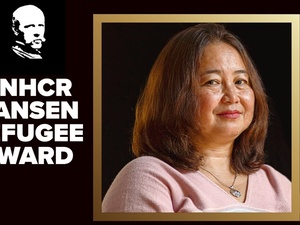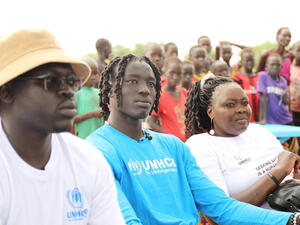Goldmine dreams end in death for six displaced Afro-Colombians
Goldmine dreams end in death for six displaced Afro-Colombians

Displaced Afro-Caribbeans, like these living in squalid conditions in Chocó, are desperate for any job.
QUIBDÓ Colombia, October 26 (UNHCR) - In a poor barrio of Quibdó, the main city in the Colombian rainforest of Chocó, the local population is in shock. Six local men were shot dead last week by an irregular armed group and another four were seriously injured.
"We see a lot of violence all the time around here," a local woman said, "but it is a long time since we had seen a massacre like this."
The barrio has grown very fast in the past few years, with the arrival of thousands of people fleeing the armed conflict in their communities on the myriad rivers that crisscross the rainforest. The neighbourhood is very poor, houses are made of wood and tin and there are no public services. In the extreme heat and humidity, lack of running water and sanitation are serious and constant health threats.
For the largely Afro-Colombian population of Chocó, job opportunities are few, and become even slimmer for those who are displaced. A few weeks ago, the men of the barrio received an offer to work in a goldmine near Istmina, some two hours by road to the south. For many, it was an undreamt of chance to earn money and better their living conditions.
Little did they know that by accepting the offer, they were walking straight into a bitter dispute between irregular armed groups. On Oct. 16, only two days after they arrived in Istmina to start work, members of one of these groups burst into the mine, armed and in uniforms. They shot and killed six of the men and wounded another four, all displaced Afro-Colombians.
"This is the latest in a series of very serious abuses the irregular armed groups have committed against the civilian population and displaced people in this part of Chocó," said UNHCR Deputy-Representative in Colombia Roberto Mignone, who went to Chocó in the aftermath of the killings.
He added that UNHCR was very concerned that the worsening humanitarian situation would be the cause of more displacement from the region, which is home to both Afro-Colombian and indigenous communities. Under principles of constitutional and international laws, the state has a special responsibility to protect and prevent the displacement of ethnic minorities with a special relation to the land, which is the case for both indigenous and black communities in Colombia.
Despite the government's efforts to control the area, the civilian population along the San Juan and Baudó rivers continues to suffer from intimidation, threats, violence and killings at the hands of the irregular armed groups. Just since the beginning of September, the Diocesis of Istmina has reported 23 targeted killings just in the city. In recent months there have been various cases of mass displacements affecting hundreds of people, and day after day families are fleeing their home to escape the conflict.
Chocó's biodiversity is one of the richest in the world - the rainforest is wealthy in minerals and precious woods, while its rivers provide direct access to the Pacific Ocean. In a country ridden by conflict and illegal crops like coca, it is prime territory. Irregular armed groups have been fighting for control of its lands and access to the sea for years.
"The humanitarian situation along the San Juan and Baudó rivers has worsened significantly since the start of the year and UNHCR is calling on all relevant actors to respect the rights of the civilian population," Mignone said in Chocó, also expressing his condolences on behalf of the UN agency to the families of the deceased.
Last week's murders of the six displaced Afro-Colombians happened just two days before Colombia's Constitutional Court sat in special hearing to review measures taken by the government to protect Afro-Colombian communities from forced displacement. The court had found last year they were "persistent gaps" in targeted efforts to prevent their forced displacement and protect them afterwards.
By Marie-Hélène Verney in Quibdó, Colombia









